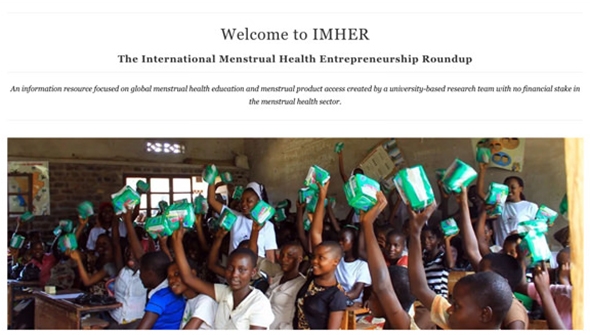Associate Professor of Government Deborah Jordan Brooks and a team of students have created a website that consolidates information on global menstrual health education and access to menstrual products for low-income girls and women around the world.
Dubbed IMHER—the International Menstrual Health Entrepreneurship Roundup—the site provides information of use to small-scale, local entrepreneurs working in Africa, Asia, and South America.
“It is local entrepreneurs with knowledge of their area’s needs who can best get this work done in their communities,” says Brooks, the faculty coordinator for gender-based initiatives at the John Sloan Dickey Center for International Understanding.
Under the Dickey Center, Brooks established the Dartmouth Global Girls Forward Lab, a team of undergraduate students focused on global development issues pertaining to women, to compile content featured in IMHER.
“This is not a project just about making menstrual health products more widely available. It’s a project that aims to promote human dignity, and that’s a big deal,” says Daniel Benjamin, the Norman E. McCulloch Jr. Director of the Dickey Center. “I’m thrilled that they and the Dickey Center have produced something that has the potential to make a real difference in empowering women in the developing world.”

The roots of IMHER go back to 2017, when Brooks was a mentor for Dickey’s Young African Leaders Initiative (YALI) and met YALI Class of 2017 Grace Ningejeje, founder of the Burundi-based nonprofit organization Uplifting the Girl Child and author of Break the Taboo on Menstrual Health. As part of her work with the YALI program, Ningejeje researched the options for producing high-quality, low-cost menstrual pads in Burundi.
Working with Ningejeje, Brooks realized that many entrepreneurs entering this space need to gather the same information when they start out. This spurred the idea of creating a website that consolidates educational and product resources on global menstrual health.
“While IMHER can help to make accurate information more accessible, it is female entrepreneurs like Ningejeje who are at the center of change, creating solutions to help address issues affecting the health and well-being of girls and women,” Brooks says.
Benjamin says IMHER illustrates the breadth of the connections that are possible through global initiatives like the YALI program.
“I’m incredibly pleased to see another collaboration between Dartmouth faculty and students and alums of the Young African Leaders Initiative who were here on campus. We have a fabulous network of young Africans working with us to address big problems, and nothing could be more rewarding.”
IMHER features links to organizations and free resources from around the world on menstrual education and healthy self-care through several searchable databases. As the website came together over the past year, Brooks and her students have been building it out to include information that will be useful to a broader audience.
“It also has information of use to larger menstrual health and women’s organizations, to researchers and students of these topics, and potentially to donors who might be looking for organizations that work on these issues in particular countries,” says Brooks.
The goal is to make IMHER a “living resource,” Brooks says. The site encourages users to suggest organizations, educational resources, and documentaries/digital stories to add to their database and provide feedback about the website, allowing readers to help build part of the information base that others in the field can then use. The developers also plan to create a blog and offer other resources in the future.
William Platt can be reached at william.c.platt@dartmouth.edu.
Amy Olson can be reached at amy.d.olson@dartmouth.edu.


